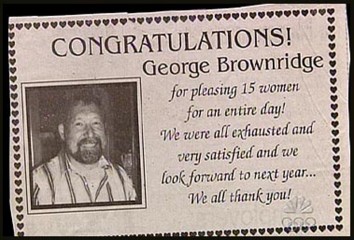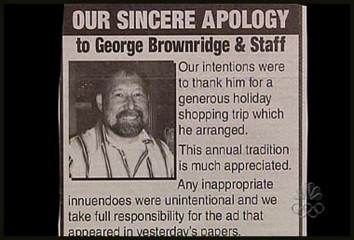Links and things that I’ve run across recently.
… or not so recently.
Perl and other programming stuff
Some of what I’ve been doing during my absence from this blog, and some stories I hope to tell in more detail both here and on my software-development blog:
-
Tom Metro and I launched a new brand for our Perl project consulting: welcome to The Perl Shop.
-
I gave a talk on Perl 6 benchmarking, for our local Perl Mongers group, in December.
-
I also participated in the Dallas/Fort Worth Perl Mongers Winter Hackathon. I hope to write more about the experience, the reason I participated, and my data-deduplication solution, all on my SD blog.
-
In the interim, I also happened upon a phone interview with a local company looking for real developers to do advanced JavaScript stuff. I imagine it’s probably a really nice place to work, but I was left with a less-than-competent impression based on the interviewers displayed programming skills. That’s yet another story, but it’s also how most companies do programmer interviews. Brief lesson: if you don’t mind looking like an idiot, feel free to follow what all the other idiots are doing.
Getting Drunk on Fringe
I’ve been slowly making my way through Fringe on NetFlix.
I discovered a new drinking game. Here’s how it works:
Step 1: Watch Fringe with me.
Step 2: Take a drink whenever I spontaneously say, “Hey, wait! You can do that?”
That’s it. You’ll be drunk in no time flat.
All in all, however, I still think I like The X-Files better.
Congratulations, George!
Ran across this on social media. Tracked it down to a Huffington Post piece (which credits NBC).
Briefly, this note of congratulations appeared in a local paper:
This was followed up by the following correction:
Today’s Quote
Pundits tend to write off political paranoia as a feature of the fringe, a disorder that occasionally flares up until the sober center can put out the flames. They’re wrong. The fear of conspiracies has been a potent force across the political spectrum, from the colonial era to the present, in the establishment as well as at the extremes. Conspiracy theories played major roles in conflicts from the Indian wars of the seventeenth century to the labor battles of the Gilded Age, from the Civil War to the Cold War, from the American Revolution to the War on Terror. They have flourished not just in times of great division but in eras of relative comity. They have been popular not just with dissenters and nonconformists but with individuals and institutions at the center of power. They are not simply a colorful historical byway. They are at the country’s core.
(Jesse Walker, The United States of Paranoia: A Conspiracy Theory. Jesse has spoken about his book in multiple forums, including Cato, BookTV, Reason.TV, NPR, RadioWest.)

